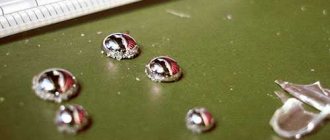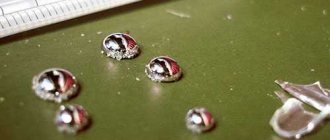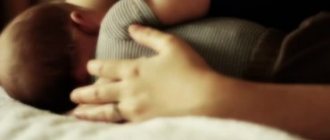Young children are just beginning to explore the world, and in the process of learning they use all their senses. They definitely need to taste any interesting items. The result of such studies may be unexpected: a child was crawling, playing, looking, and inadvertently swallowed 2 rubles.
This seemingly innocent situation can actually turn into a serious threat to the baby’s health. What to do if this happens?
This technique is becoming increasingly popular. However, because the object is viewed on an x-ray rather than directly, it may be more difficult for a doctor to detect damage to the esophagus. Additionally, since your child is awake throughout the procedure, he or she may become restless, agitated, or anxious. This method can only be used if the object is smooth and has been stored for no more than 72 hours, and if your child can remain calm during the procedure.
If difficulty occurs during this procedure or blood appears, the doctor may need to perform an esophagoscopy to determine if there is injury to the esophagus. Wait 24 hours If the object is smooth and already in the lowest part of the esophagus, your doctor may suggest a watchful wait. An x-ray will be taken 24 hours after your baby is swallowed. If an object gets into your stomach, your doctor will ask you to watch for it to come out. If the x-ray shows that the object is still in the esophagus, one of the first three methods described above can be used to remove it.
How can you tell if a child has swallowed a coin?
If the incident happened before your eyes, there is nothing to think about - call an ambulance immediately
. Even if the baby feels well and there seems to be no threat, in such situations you should not take risks. But what should you do if your child swallows a coin in your absence? Even those children who have already learned to speak often do not admit to such things, fearing that they will be punished.
If your child swallows a battery, seek immediate medical attention, even if your child has no symptoms. The doctor may want to take an x-ray to see where the battery is and make sure it is not going into the gastrointestinal tract. If your child swallows something sharp, such as a piece of glass or an exposed pin, call your doctor, even if your child has no symptoms. Sharp objects can sometimes damage the esophagus, stomach, or intestines.
If your child swallows a smooth object, such as a coin or small rock, and has no symptoms, contact your doctor to determine the best course of action. You may be able to wait and see if the object passes through the digestive tract on its own. If more than 24 to 48 hours have passed and you do not see an object in the toilet or in your child's diaper, or if your child begins to experience symptoms of an object obstruction, contact your doctor.
Symptoms directly depend on the location of the ill-fated coin, which could immediately slip into the esophagus, or could get stuck in the respiratory tract. In the latter case, you will notice changes in the baby’s condition immediately. The person responsible for the incident will change his behavior: he may begin to choke, wheeze, or make other unusual sounds.
In most cases the prospects are excellent; the object will pass on its own or can be removed without complications. Complications from esophagoscopy may include bleeding, tears in the esophagus, or complications from the anesthesia. Complications of the balloon catheter technique include vomiting, short-term airway blockage, and esophageal injury. However, these complications are rare.
Why does it make little difference whether a coin is stuck in the esophagus or in the trachea?
Disclaimer: This content should not be considered complete and should not be used as a substitute for calling or visiting a healthcare professional. Use of this content is subject to specific. There's a danger in your cabin fever - lithium batteries, also known as button batteries, causing injury and death to children. When swallowed, these small batteries become lodged in the esophagus. The saliva causes an electrical current, which causes a chemical reaction that can severely burn the esophagus in just two hours.
If timely assistance is not provided, a blue face, general weakness and immobility may occur. If you experience these or similar symptoms, most likely your child swallowed a large 10-ruble coin. Don't hesitate what to do - call a doctor immediately! Delay can be fraught with asphyxia - and the younger your son or daughter, the greater the risk.
Signs that a child has swallowed a coin
Lithium batteries can be found in everything in your home. They are used to power remote controls, toys, musical greeting cards, calculators, watches and other electronics. Young children often have easy access to these devices, and many parents are unaware that there is a risk.
Incidents
What are the signs that my child has swallowed a battery?
Signs that your child has swallowed a button battery may include. Sudden onset of crying Drowling Reduced eating or drinking. Pain in the abdomen, blood in saliva and stool.
- Difficulty swallowing.
- Sad voice.
- Head.
- Pain or discomfort.
The above symptoms may also be mistaken for another diagnosis.
Parents or guardians should be aware that these batteries can be found anywhere in the home and think of this as an option if a child is in distress. It is more difficult to understand what to do if a child swallows a penny
, and it entered the esophagus. The situation seems less dangerous only at first glance: the sharp edges of the coin can injure the mucous membrane and cause bleeding or other complications. This condition in the victim may not be immediately recognized, but the following symptoms may indicate this:
Watch this video to learn more about the dangers of swallowing button batteries and what to do if you think your child has swallowed a battery. This is urgent! Take your child to the emergency room immediately, ideally Children's Hospital.
The battery may become stuck in another area or change its location and increase the risk of injury.
- Do not give medications to cause your child to move bowels or vomit.
- Do not give your child anything to eat or drink.
- Don't give milk; this will not prevent further injury.
If your child swallowed something that isn't sharp or potentially dangerous and it doesn't appear to be stuck in her throat, she'll probably be fine on her own.
She will probably hold the item in her stool and end up no worse for the experience. Against the background of the above, the child’s general weakness, a decrease in his mobility and a deterioration in mood are likely.
The listed symptoms are typical for situations where a coin gets stuck in the esophagus or injures the mucous membrane. However, if the child swallowed a small coin (for example, 10 kopecks) that did not affect the internal organs, you may not even know about this incident until you discover an unexpected object in the potty.
While you wait, monitor her closely and call your doctor if she begins to vomit, drool, refuse to eat, develop a fever, cough, wheeze, or make a whistling sound when she inhales. Give the doctor a call if you don't see an object in your child's stool in the next couple of days.
If you think your child has swallowed something sharp or otherwise dangerous, go to the doctor immediately, even if she seems fine. These things may need to be removed rather than allowed. They can cut through a baby's esophagus, stomach or intestines, flush out dangerous substances, or even create a small electrical current.
If the coin came out naturally, there is nothing to worry about - unless, of course, the baby’s well-being indicates otherwise.
Simply brilliant!
But still, the main flow of patients with “foreign bodies” are children from one to three years old, as noted in the surgical department of MONIKI named after M.F. Vladimirsky. Every year here in the clinic more than a hundred operations are performed to remove a wide variety of objects. And many other hospitals in the Moscow region receive five to seven children every month who wanted to try something while playing and accidentally swallowed it. Medical practice shows that fidgets can “eat” almost anything. “The nature of foreign bodies can be completely different - from small components of toys to various key chains and jewelry, the shine of which may interest a child,” the press service of the Moscow Region Ministry of Health reported, citing MONIKI employees. “The most common options are coin and disc batteries, which are commonly found in educational and interactive toys.”
In the Mytishchi City Hospital they still remember the family that brought their one-and-a-half-year-old baby to the diagnostic department. The adults suspected that their son had swallowed the coin. X-ray quite clearly “saw” the two-ruble round piece. We decided to perform endoscopic surgery. And then it was discovered that there was another coin in the baby’s stomach. Judging by its appearance, it had been lying there for a long time. The surgical team quickly removed the coins. The internal organs were not damaged, the baby’s life was saved. And at the Kolomna City Hospital, surgeon Dmitry Matyushenko and his colleagues removed an accidentally swallowed plastic crystal from the stomach of a three-year-old patient. “We had to remove fragments of toys, coins, metal balls from the gastrointestinal tract,” recalls Dmitry Matyushenko. — The most complications arise if children swallow magnets. Several magnets interlocked with each other can damage the internal organs of a child. We have had to remove several pieces that were stuck together inside and caused perforation of the small intestine.”
Prohibited techniques: what not to do
Many parents, even after calling an ambulance, begin to take prompt action to quickly get rid of the foreign object. In most cases, such measures not only do not help, but can also aggravate the situation. What absolutely should not be done if a child swallows a ruble or other large coin?
It depends on what your child has swallowed and whether they seem stuck. The doctor may take an x-ray to find out where the object is. If the doctor thinks the object will move safely through your baby's system, you may need to monitor your baby and his bowels over the next few days.
If the object is in your baby's airway or stuck in his esophagus or stomach—or if it is dangerous to wait for the object to pass because it is sharp or otherwise dangerous, the doctor will remove it. An endoscope is most likely to be used if the object is in your child's esophagus or stomach. If a similar instrument called a bronchoscope will be used in his airway. Sometimes surgery is required to remove the swallowed object.
And in general, the less fuss and worry that follows on the part of parents, the better. Fear will only worsen the child’s well-being.
Parents' reaction
There are a number of actions that can be taken before the doctor arrives. If the child does not refuse food, you can feed him foods containing fiber (porridge, fruits, mixtures containing bran).
What should I do if my child is choking on an object?
Is there a way to keep my baby from putting stuff in his mouth?
It is an instinctive way for babies and young children to learn about the world around them and constant risks until the age of 4. Lectures on choking hazards are pointless. Check your floors and counters for items your child might find and put in their mouth. For example, buttons, jewelry, pins, coins, pop-up balloons, pen caps, paper clips, ties, screws and nails, crayons, balls and button batteries should be kept out of reach. when you visit someone else's home.
- All sorts of tempting objects may be within reach.
- Be mindful during the holidays, at home and away.
David Smith, who they say downplayed the dangers.
within five hours of the parents arriving at the hospital, the complaint states. This helps speed up the digestive process. However, there is no need to force food into the child - especially if you see that the food is moving back.
Prohibited techniques: what not to do
Her mother was home at the time and saw her daughter swallow a coin-operated battery that had popped out of the remote control.
She rushed to pull it out, but it went down her throat and she called. These batteries are found in remote controls, calculators, and other small devices. Many women receive a double mastectomy when only one breast has tumor.
- Weight loss surgery is associated with long-term digestive problems.
- A home builder is recovering from an accidental nail gunshot to the head.
At the hospital, the parents wanted the battery removed right away because they were worried the girl would be exposed to dangerous chemicals.
But the father said Smith told them the incident was "no different than a coin in the throat." If a child swallows a ruble and it gets stuck in the airway, place the baby on your lap, belly down. The upper body should be at an angle. Lightly but firmly pat him on the back several times.
. This may help remove the coin or make it easier to breathe.
After the doctors arrive, try to calm the baby down and explain that he will soon get help. In the hospital, the child will be examined using X-ray technology, and based on the result, a decision will be made on further actions. The coin can be removed using endoscopy, but in difficult cases, full surgery may be required. However, it is also possible that the doctor will let you go home, since the coin will most likely come out naturally soon. But if this forecast does not come true, and the child’s condition worsens again, you need to see a doctor again.
How to prevent such cases
He seemed pretty relaxed about the whole situation,” Parsons said. "After some time we learned there was an electrical burn going on in her esophagus and she was rushed into emergency surgery." Defense attorney Eric Ragatz said the amount the parents are seeking has not yet been determined. The girl's mother, a nursing assistant, also left her job and was just returning part-time to care for her daughter.
Items to be removed
Parsons said doctors told him their daughter may need to continue treatment to stretch her esophagus well into her teens. While other toddlers experiment with foods of many textures, she can only eat soaked foods, which Parsons says has stunted her growth.
What else is dangerous?
Even the most attentive parents sometimes find it very difficult to keep track of their little one’s movements. Therefore, you should protect him as much as possible from any small objects and details that he may want to taste. The most risky period is the transition from sitting motionless in a stroller to crawling and exploring the space around.
How can you tell if a child has swallowed a coin?
“They don’t really have to say much about what exactly will happen with her course,” Parsons said, “It’s the unknown that worries us.”
Mom's new neurosis: it's no joke. They explore their world by touching everything and putting everything into their mouth as potential food. The good news is that swallowed coins are scary but rarely fatal. And while your best bet is to comb that living room floor to make sure there's no danger, here's what to do if it does. It is very important that any place where the child is is clean and tidy. The greatest danger for the little explorer are sharp objects: needles, buttons, nails, splinters and debris.
Money and other “adult” items should also be kept away from children. Put all dangerous little things on high shelves, in closed drawers and other places where the child, with all his desire and enthusiasm, cannot reach.
First of all, scary stuff. If a child swallows a coin or small object, the most important thing is that they do not choke. Problems with breathing, swallowing or speaking are a cause of immediate concern. If the coin lodges in the esophagus, your child will show signs of increased salivation, difficulty swallowing, vomiting, neck pain, chest pain, or coughing.
Coin in the respiratory ducts
If a coin lodges in the intestines and causes tears in the intestinal wall, the stool is often dark or bloody. The baby may also experience stomach pain, vomiting, and decreased bowel sounds. Finally, be aware of what your child has ingested. Button batteries can burn a hole in the stomach lining within a few hours.
Security measures
For a baby you should approach it very carefully. Do not buy Lego constructors and other sets consisting of small parts for very young children.
Also undesirable are magnets and battery-powered toys that a child can remove independently. Give preference to large and safe items.
Until the child learns to walk, do not leave him unattended
and watch carefully what he plays with. This applies not only to the house, but also to the street and yard. And, most importantly, from an early age, do not let your baby put inedible objects in his mouth. If you don’t explain in time that you can’t do this, the child will swallow the next 50 kopecks - and there’s nothing to be surprised about.
The health of the child is always the first priority for every parent. As the baby grows up, he tries to explore the world on his own, waving his arms and starting to pull various objects into his mouth. As a result of such childhood experiences, children often swallow foreign objects, which horrifies their parents. Statistics point to the fact that children swallow coins most often. How to behave in such a case and what actions to take to protect the child from dangerous consequences?
| Contents of the article: 1. 2. 3. 4. 5. |
A child swallowed a coin: possible danger
If a coin enters the gastrointestinal tract, in most cases it comes out with the feces after 3-8 days. In the case when the child behaves normally and symptoms do not appear, parents can rest assured. The baby begins to complain about his health if an object is stuck in the esophagus. Difficulty swallowing, nausea, vomiting, hiccups, and excessive drooling are the most common signs that indicate a problem.
After a child swallows a coin, it ends up either in the esophagus or in the respiratory tract. The second scenario is the most dangerous for health. In this case, oxygen does not enter the lungs, which can lead to suffocation. If a foreign body is stuck in the respiratory tract, the right bronchus most often suffers. Wheezing noise in the lungs, breathing problems and paroxysmal cough are the most common symptoms.
Other factors may also indicate the presence of objects in the respiratory tract. A bluish complexion, a hoarse voice, and suffocation during prolonged inhalation should especially alert parents. It is easy to determine that a coin has entered the trachea area by other signs: when a child screams or cries, you can hear a slight flapping sound. If parents notice such symptoms, they should immediately call an ambulance.
The mystery of the penny
This also happened in our family - my daughter accidentally swallowed a fish bone that, due to carelessness, was not removed from the baked fillet.
At first everything was fine, but then the child began to complain about a bone in his throat. No bone was visible even in the light of a smartphone flashlight. Maybe he's joking? Well, apparently not. We decided to consult at the Moscow emergency room. And they said that they would send a brigade, since it could be dangerous. The arriving doctors also could not immediately see the bone and took him to one of the city hospitals. And already there, an experienced ENT specialist saw the desired thorn in the tonsil and quickly pulled it out. In the same hospital we met several other parents with the same problem. Children are inquisitive and inquisitive people. And sometimes also “hiding secrets.” Such, for example, is a 59-year-old (!) resident of Zelenograd, who was brought to the doctors by a “forgotten” coin in his nose. Out of curiosity, he stuck it in his nose at the age of six, but was afraid to tell his parents. Well, I stuck it in and stuck it in - nothing bothered me. Over the years, the innocent prank was forgotten. And then a month ago the man noticed that it became somehow difficult to breathe through his nose. At first I didn’t pay much attention, but when it got worse, I finally turned to the city clinic. Doctors initially thought it was all due to a deviated nasal septum. They sent the patient to the now popular CT scan, and discovered some kind of strange “round thing,” says Tatyana Mikhailova, an otorhinolaryngologist at the Konchalovsky Hospital. Only then did the patient remember his secret from his distant childhood. A computer study showed that the penny has become firmly entrenched in the nose over the last Soviet and post-perestroika years. As Zelenograd doctors say, a “rocky conglomerate” has formed around her. He had to be removed under anesthesia. In the hour and a half that the endoscopic operation took, it was possible not only to remove the numismatic rarity, but also to correct the nasal septum. The surgical intervention took place without complications. “On Friday we operated on him, and on Monday he was already discharged,” otolaryngologist Elena Nepryakhina recalls the curious case with playful relief. “The patient, apparently, was so tired of long-standing breathing problems that, despite our recommendations, he hurried to remove the tampons from the nasal passages. But they must be preserved after the intervention for two days. These tampons, like a frame, hold the structure that we assemble after surgery. His mother is not strict with him.” Jokes aside, but this penny could transform into a million problems. Cranial and purulent complications could well have arisen. It worked out...
Symptoms
If a coin or any other object is stuck in the esophagus and cannot come out on its own, then it is easy to understand this by the following signs. The acute form of a foreign body can injure the mucous membrane and cause bleeding or any other symptoms.
It is possible to find out that the child’s condition has worsened by the following signs:
- Chair. The parent finds an admixture of blood in the stool;
- The little patient refuses to eat. The child experiences pain during feeding;
- Sharp pain in the abdominal area, which just begins to intensify;
- Vomiting and nausea that manifests itself for no apparent reason;
- General weakness. The child is in no mood, he behaves sedentary and restless.
Parents need to closely monitor the child's condition if he has swallowed a foreign object. Behavior that is atypical for the baby should cause concern. Particular attention should be paid to when a child indicates pain in the chest area when trying to swallow food. This sign indicates that a coin or any other object is stuck in the respiratory tract.
There are often cases when a parent does not even know that the baby has swallowed a coin until it ends up in the potty. The least dangerous crumbs for health are coins with a face value of 10 kopecks. If the foreign body is passed out along with the feces on its own and the child is not bothered by adverse reactions, then the fears are pointless.
A visit to the doctor will not be superfluous when a child has swallowed a foreign object, but there are no changes in his behavior and well-being. If within a certain time the object does not come out on its own, the doctor will order an x-ray to find out in more detail the location of the coin. In the case where the procedure indicates that the foreign body has passed the esophagus, further fears are in vain: in such a case, the coin should come out on its own along with the feces. The main task of parents during this period is to monitor the condition of their child and, if any symptoms appear, visit the doctor again.
If parents are sure that their child swallowed a coin, then they first need to try to establish what size the object was. There will be less concern if the coin was small. The damage to the health of a small patient will be much greater if the child swallows a large coin. In this case, parents are obliged to make sure that the object does not enter the respiratory tract. It is easy to find out about this by the condition of the baby (his respiratory process is disturbed).
Symptoms
What are the symptoms if a child swallows a coin?
Once in the esophagus area, the object will cause anxiety and tearfulness. The discomfort caused will make you refuse to eat and regurgitate the offered food. The baby will begin to hiccup and salivate. Coughing and shortness of breath are possible if a large coin puts pressure on the respiratory tract as it passes through the esophagus. A child's esophagus is a very vulnerable system. It contains muscle groups, the contraction of which will lead to spasm and subsequent complications when irritated. Pay attention when, when trying to swallow something, the child complains of pain, while pointing to the chest area.
Be sure to consult a doctor as soon as possible. Perforation of the esophagus is possible, accompanied by bleeding, and other extremely unpleasant health consequences, including death.
What to do if a child swallows a coin: first aid
Calling an ambulance is necessary if the child begins to choke and his face turns bluish. The parents' reaction should be immediate when an object enters the respiratory tract. It is necessary to provide first aid to a child under 1 year of age in the following way:
- place the patient so that his stomach is on the forearm of the hand, his face should be at an angle of 60 degrees downward;
- apply 5 blows with the edge of your palm between the shoulder blades; this technique will protect the patient from suffocation;
- if the child’s condition worsens, it is necessary to carry out artificial ventilation until the arrival of intensive care.
You should carefully monitor the condition of the victim when the coin is in the esophagus. If the above symptoms appear, it is recommended to immediately visit a doctor. If nothing bothers the child, he should be helped to speed up the process of removing the foreign body. It is easy to activate the digestive process by giving your little patient food rich in fiber. Particular attention should be paid to such products as: vegetables, fruits, cereals, bran (added to food).
Parents' actions
If a child swallows a coin and it most likely gets into the respiratory tract, immediately calling an ambulance is the only way out of the situation. While waiting for help, you should proceed as follows. Place the baby on the forearm so that his face is down. Next, you should make several patting movements along the middle part of the back.
This can prevent you from choking on a coin you swallow.
If the injured child is 3 years old or older, it is recommended to have a calm conversation with him and explain why the doctors will come. It would be appropriate to distract from unpleasant sensations that only increase the victim’s anxiety.
Usually, already in a hospital setting, the baby is prescribed procedures such as x-rays or endoscopy of the gastrointestinal tract, it all depends on the results of the preliminary examination and the age of the patient. Research of this kind will help to quickly determine exactly where the swallowed coin is located.
Upon completion of the procedures, the doctor decides on further tactics.
There are difficult cases when, when a large object is swallowed, surgical intervention is required to remove it. If the baby’s condition worsens and he complains of pain, the patient should be under the supervision of medical staff until the foreign object is removed or spontaneously leaves the body.
Dangerous techniques!
In their desire to alleviate the condition of their child, many parents make the same mistakes, which can only worsen the situation. The child should not be given laxatives or given enemas. It must be remembered that stimulating intestinal motility will only worsen the condition of a small patient. In such a case, an object can injure the mucous membrane or lead to intestinal obstruction.
Wanting to speed up the process of removing the foreign body from the intestines, some parents begin to force-feed the child. This technique will not give the desired effect, but will only worsen the situation. The foreign object should pass out on its own along with the feces. There is also no need to shake the baby in order to speed up the coin withdrawal process. Such actions will frighten the child. It is best to calm the baby down and show him to the doctor.
Health care
If a child swallows a coin or other similar foreign object, in most cases it will pass through the intestines on its own. It is necessary to seek the help of a specialist when the baby is concerned about his health. The most dangerous case is when an object gets into the respiratory tract. In such a situation, resuscitation should be immediate.
Further diagnosis of the little patient’s health condition is carried out in the pediatric surgical department. X-rays help the doctor determine the location of the coin. For the purpose of diagnosis and simultaneous treatment, the doctor resorts to endoscopy. Using a thin tube (on which a camera and forceps are located), the intestines, esophagus and stomach are examined. After the endoscope detects the location of the foreign body, it is used to remove the object. In some cases, the procedure does not even require anesthesia. Endoscopy is an effective and efficient method for removing objects in case of obstruction.
If a foreign body enters the bronchial region, then all basic manipulations are carried out only after the administration of anesthesia. You cannot refuse the painkiller, since in this case the glottis will begin to close, which will block access to the device. After the operation, the patient is placed in a hospital, where doctors monitor his further condition. If necessary, doctors prescribe antibiotics to the little patient, which help prevent infection in the bronchi and lungs.
Parents should carefully monitor how their child spends his time and what objects he uses to play.
When a toddler begins to crawl, it is extremely important to remove all potentially dangerous and small objects from his field of vision. Your baby's toys should be safe, durable and free of small parts. See information about buying Bitcoin here.
What not to do
What to do if your child swallows a coin? Young parents often cannot answer this question. However, there is a list of actions that are strictly prohibited, because they can lead to an emergency and dangerous situation.
It is visually difficult to determine where a metal object swallowed by a baby is located.
Therefore, it is forbidden to give an enema in such situations. Active stimulation of the intestines often leads to obstruction, severe damage, and injury.
You cannot force a child to eat. In this way, many adults try to quickly move a foreign object through the gastrointestinal tract, which is unsafe. You should not shake the baby upside down; there is little benefit from such actions, and fright is guaranteed for the victim. It is extremely undesirable to give painkillers, which will interfere with determining the exact location of the swallowed coin.










